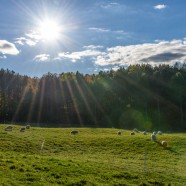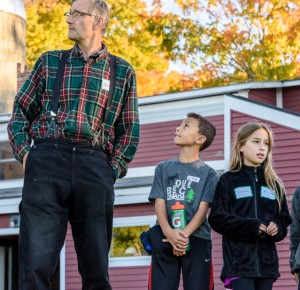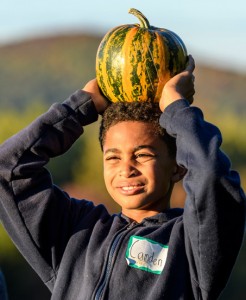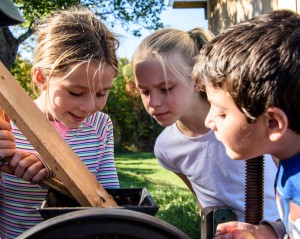
Working in teams, Milton’s fourth graders were assigned a straightforward task: Using toothpicks and mini-marshmallows, develop and execute a plan to build the tallest possible structure in less than five minutes.
It sounded easy enough. But halfway through the process, Robert Lightbody, director of multiculturalism and community development in Milton’s Lower and Middle schools, began shaking things up. He reassigned students, which forced the groups to bring their new teammates up to speed and consider novel approaches.
The exercise came during a break between farm chores and hiking, on a trip to the Mountain School of Milton Academy in Vershire, Vermont, last October. The visit was a short course in agriculture—the Mountain School is a semester program for 45 high school juniors from across the country each fall and spring—and an opportunity for fourth graders to bond outside of the comforts of the classroom.
Last September, seven new students joined a tightknit group of fourth graders. “Getting to know each other and working together is a major focus, so coming to a farm, and seeing how the older kids have to work together, really supports what we’re doing at Milton. It builds community,” said Grade 4 teacher Sandra Correia.
 With sweeping vistas of foliage nearing peak vibrancy, organic produce ripe for the harvest, cattle and sheep dotting grassy pastures (protected by Desmond the “guard llama,” a favorite of the fourth graders) the Mountain School provided a dream backdrop. Unseasonably warm, sunny days cooled into cloudless nights and students enjoyed campfires and stargazing.
With sweeping vistas of foliage nearing peak vibrancy, organic produce ripe for the harvest, cattle and sheep dotting grassy pastures (protected by Desmond the “guard llama,” a favorite of the fourth graders) the Mountain School provided a dream backdrop. Unseasonably warm, sunny days cooled into cloudless nights and students enjoyed campfires and stargazing.
The fourth graders impressed Mountain School faculty member Jack Kruse, who also directs the work program. “When I introduced them to our wood program and how we heat our facilities, they were so interested. I had forgotten how funny, active, imaginative and even patient kids are at this age. Honestly, a pile of wood, some splitters and a wood stove are not as exciting as a llama, but they were really into it, asking great questions.”
After years in the same class, it’s natural for kids to develop a shorthand and a structure that dictates their interactions with one another. In organizing the trip, faculty divided the students purposefully, breaking up established friend groups. During the mornings and in between farm chores, they played challenging games designed to help them understand group dynamics. “We were intentional about making these classmates a little uncomfortable, then helping them to re-form groups in many different ways,” Robert said.
The students left Milton on a Wednesday morning and returned Friday afternoon. Not everyone had an easy trip—they contended with blisters, fears about being away from home, and exhaustion from their farm chores. Some anxious tears were shed, and a handful of complaints cropped up over the work that needed to be done. Out of their comfort zone, boys and girls had to rely on one another.
 “Before I came here, I was a little bit nervous, but still thought it would be great, and it has been,” said Amelia. “We have room buddies, and they set it up so there’s a new kid in each group, so it’s been a good way to get to know new people.”
“Before I came here, I was a little bit nervous, but still thought it would be great, and it has been,” said Amelia. “We have room buddies, and they set it up so there’s a new kid in each group, so it’s been a good way to get to know new people.”
“This might be the first time they’re this far from home by themselves, and the first time that they’re responsible for getting themselves up and ready for the day without the help of their families,” said school counselor Carla Ko. “They’re learning that they have that resilience, that ability, that independence, to take on some of these personal challenges.”
Being far from home with no access to their parents was challenging for some—cellphone service at their nearby hotel was spotty at best; at the Mountain School, it was nonexistent—but they worked through it, said Robert. One student almost immediately asked to contact his parents, and the adults on the trip had to convince him that he was going to be safe without them.
Another student cried on the way to Vermont and dreaded the sleepover portion of the trip. The two boys sharing his hotel room asked whether they could do anything to help. “He said, ‘This is hard. There’s nothing anybody can do to help me. I just need to get through this,’” Robert recalled. “He ended up being fine, and the roommates were so understanding.”
Everyone who comes to the Mountain School discovers resilience, says Milton junior Rachel Handler.
“It can be pretty discombobulating and absolutely exhausting, managing the time between academics and working on the farm,” she says. “But I’ve come to absolutely love it. I feel more energized when I go back to class after working in the afternoon. I’m working not just with my mind, but physically as well, and I find that very invigorating.”
 Farming requires cooperation, and a lot of labor, says Rachel, who has grown close to her Mountain School classmates and faculty through working side by side.
Farming requires cooperation, and a lot of labor, says Rachel, who has grown close to her Mountain School classmates and faculty through working side by side.
The students and adults at the Mountain School made the visit exciting for James, a new fourth grader, who appreciated their explaining how and why chores are done on the farm. “Even though we’re not from here, the people at the Mountain School are treating us like we’ve been here for a long time. We’re seeing how much work it takes every day to run the whole farm.”
Milton’s Lower School students have a community garden behind the Junior Building. Third graders learn about planting and harvesting, and they take an overnight trip to the Farm School in Athol, Massachusetts. At the Mountain School, children took on different tasks, from clearing a greenhouse to making apple cider, cutting back invasive plants, repositioning fences around the farm’s cattle pastures, and picking potatoes, tomatoes, cabbage and peppers.
For Dean, doing all the work was the best part. “This is a good challenge, because we’re actually outside and it’s hot, so it’s hard work. Working together is going to make our class a lot stronger, and I think we’ll be more helpful to each other now.”
“I like learning about how everything is connected,” said Camilla. “There are so many steps, and if something goes wrong, it can change everything. When you work for your food, it tastes a lot better, and you know what you’re eating.”
 The fourth graders “stretched themselves,” trying new things in an unfamiliar environment, said Head of School Todd Bland, who accompanied the students on the trip. “They’ve stepped outside their comfort zone in a serious way, and they’re learning that that’s OK. They’ve worked through certain challenges and gained confidence in their own capacity to solve problems.”
The fourth graders “stretched themselves,” trying new things in an unfamiliar environment, said Head of School Todd Bland, who accompanied the students on the trip. “They’ve stepped outside their comfort zone in a serious way, and they’re learning that that’s OK. They’ve worked through certain challenges and gained confidence in their own capacity to solve problems.”
Nearly three months after the trip, a visitor to the Grade 4 classrooms would be hard-pressed to identify which students are new. Did any moments of the visit stand out as high points? “All of them,” says Robert, laughing. “All of them.”
by Marisa Donelan



